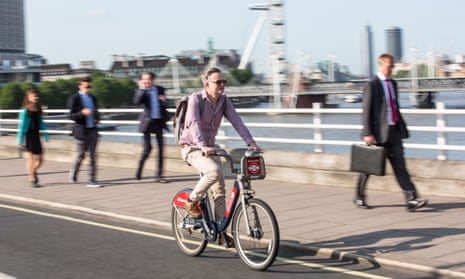Imagine if a team of scientists devised a drug which massively reduced people’s chances of developing cancer or heart disease, cutting their overall likelihood of dying early by 40%. This would be front page news worldwide, a Nobel prize as good as in the post.
That drug is already here, albeit administered in a slightly different way: it’s called cycling to work. One of the more puzzling political questions is why it is so rarely prescribed on a population-wide level.
Most people recognise riding a bike makes you more healthy. But studies have shown the impact of even a relatively modest regular cycle can have near-miraculous health dividends.
There is a credible argument that encouraging bike use to Dutch or Danish levels could do more than perhaps any other single intervention to save the NHS from collapse. It could even greatly mitigate the crisis in adult social care.
This might sound far-fetched, but consider the evidence. At the heart of the issue is what public health experts routinely describe as a pandemic of preventable illness connected to physical inactivity.
Study after study has shown far too many Britons live almost entirely sedentary lives. Research last month showed 6 million middle-aged people in England don’t even take a single brisk walk longer than 10 minutes in an average month.
This has enormous health implications, with inactive people significantly more likely to develop cardiovascular problems, type 2 diabetes, and various cancers.
One estimate is that about 85,000 Britons die early each year because of this. A study in the Lancet put the global toll for inactive lifestyles at around 5.3 million people a year, about the same as from tobacco.
Health services are further squeezed by a parallel impact on the quality of life experienced by people as they age. This also has a huge effect on social care costs, as people are less able to look after themselves.
All very worrying, you might be saying: but why is cycling the solution?
The first point is the particularly astonishing health improvement brought by cycling, greater so than walking or other moderate activity. This is because people are more likely to push their cardiovascular systems that bit harder on a bike, especially tackling hills or setting off from traffic lights.
Public health experts are not prone to hyperbole, but it’s not uncommon for them to refer to cycling as a miracle pill.
The statistic quoted in the opening paragraph comes from a study published in April, which followed the lives of more than 250,000 Britons over five years. It found the chances of avoiding cancer or heart disease were notably greater for those who cycled to and from work as against for those who walked.
Also, experts are particularly keen on bike commuting because it falls into the category known as incidental activity – exercise built around people’s everyday lives.
I cycle to work most days in part because I enjoy it, but also because an easy 20-minute trip by bike tends to take 30 or 40 minutes on public transport in London. Several studies have shown that this is the best way for activity to be maintained in a world when the majority of jobs are desk-bound.
In the UK, of course, there is a depressing qualification to all this. For all the talk of a bike boom, cycle commuting rates have remained fairly static at about 3%, while only about 1% or 2% of all trips involve a bike.
Transforming this would involve many years of political will to construct safe bike routes across the UK, and to disincentivise driving for short trips. All this might seem politically impossible, but some other countries are moving in the right direction. When you examine the consequences of not doing so, it’s clearly time for a rethink.









Comments (…)
Sign in or create your Guardian account to join the discussion